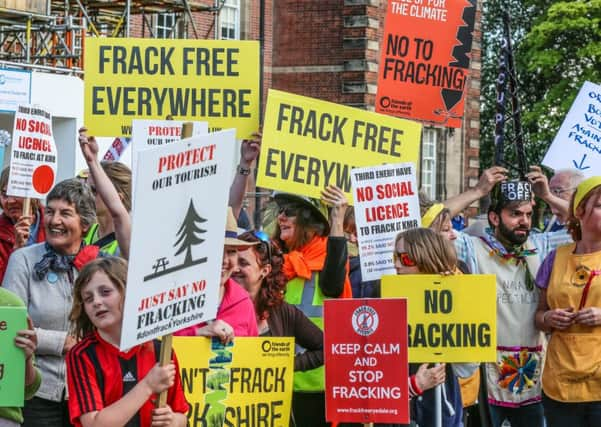SNP fracking policy prompts Ineos to send experts to England


Scotland on Sunday has learned that the multinational has informed Scottish ministers of its decision which has been made to take advantage of fracking opportunities south of the Border.
Nicola Sturgeon’s administration has imposed a moratorium on fracking in Scotland and last night the government’s line appeared to harden when the new energy minister Paul Wheelhouse said he was “deeply sceptical” of proposals to exploit shale gas reserves beneath the ground.
Advertisement
Hide AdAdvertisement
Hide AdIn contrast, the UK government has adopted a pro-fracking stance and last week North Yorkshire County Council approved an application by Third Energy to frack a well near the village of Kirby Misperton in Ryedale.
The Third Energy proposal is regarded as a landmark scheme because it is the first to be given approval since David Cameron’s government decided to give fracking the go-ahead in 2012.
Speaking to Scotland on Sunday yesterday, Ineos director of corporate affairs, Tom Crotty, said Scotland was “missing out” on the shale gas revolution at a time when North Sea oil and gas revenues were in decline. “We have effectively redeployed our resources south of the Border now and we are putting all our efforts in England,” said Crotty. “We are still in the moratorium [in Scotland] and we have been fairly clear with the government that the delay isn’t helpful.”
According to Crotty, Ineos’s team of geologists and petrochemical engineers, who are charged with seeking potential fracking sites, are now “100 per cent deployed in England”.
Ineos’s decision was last night welcomed by Scottish anti-fracking campaigners, but it was greeted with concern by those who believe Scotland is in danger of falling behind the rest of the UK when it comes to the jobs and energy that can be created by the process. Economic reports have suggested that billions of pounds worth of gas could be extracted from Scotland and thousands of jobs could be created.
“I think the Yorkshire outcome is good,” said Crotty. “What we said to the [Scottish] Government is that our focus is very much south of the Border now, where we know we can put planning applications in and we can start work. We can’t do that in Scotland. We think that is very bad news for Scotland.”
Ineos, which employs about 1,300 staff and thousands more contractors in Scotland, will this year start importing shale gas from the US for treatment at its Grangemouth plant, Scotland’s largest industrial site. But Crotty said it would make more economic sense for Scotland to be extracting gas locally from the Central Belt. Ineos has bought the rights to explore for shale oil and gas for around 280 square miles in Scotland.
Crotty said: “It would be even more beneficial if Scotland was using its own gas. At a time when North Sea revenues are falling significantly, why would you not want to develop your own indigenous capability?”
Advertisement
Hide AdAdvertisement
Hide AdThe perilous state of Scotland’s off-shore industry was highlighted last week when North Sea oil posted a loss for the taxpayer for the first time in its history. The latest figures showed the Treasury put £24 million more into investment and decommissioning than it got back in tax in 2015/16.
Ineos believes fracking, which involves drilling into the ground to inject high pressure water into subterranean rocks to release gases, would provide a new and lucrative source of energy. Environmentalists, however, have raised concerns about the carbon footprint caused by extracting more fossil fuels and the impact on local areas including the risk of water supply contamination. Those in favour of fracking believe the risks can be mitigated.
The issue has become hugely political with Labour, the Lib Dems and the Greens all opposing fracking. Many SNP activists are also vehemently opposed to the technique. In the meantime, the SNP has imposed its moratorium which is to remain in place while the evidence is examined. The Conservatives, however, believe Scotland should allow fracking. Last night, Scottish Conservative energy spokesman Alexander Burnett said: “It’s more important than ever that we find new energy sources, and we’d be foolish to ignore the possibilities of fracking. Fracking would provide a boost for the economy and potentially thousands of new jobs. It seems like this opportunity will now sadly be lost.”
In recent months, the First Minister has signalled that her instinct is to oppose fracking. In her recent reshuffle the removal of the fracking brief from Fergus Ewing was interpreted as another sign that the Scottish Government is inclined to oppose it. It had been thought that Ewing was more sympathetic towards fracking than many of his colleagues. He has been replaced as Energy Minister by Wheelhouse.
When asked to react to Crotty’s comments last night, Wheelhouse’s spokesman said: “We are deeply sceptical about fracking and have ensured that no fracking can take place in Scotland by putting in place a moratorium. We’ve also put in place a very thorough research programme and plans for a public consultation so that any decision is based on both evidence and public opinion – a move which has been welcomed by both environmental organisations and industry.
“Unless it can be proven beyond doubt that there is no risk to health, communities or the environment, there will be no fracking or unconventional gas extraction in Scotland.”
Richard Dixon, director of Friends of the Earth Scotland, said: “I have sympathy for English communities who may be seeing applications from Ineos, but for Scotland that’s certainly good news.”